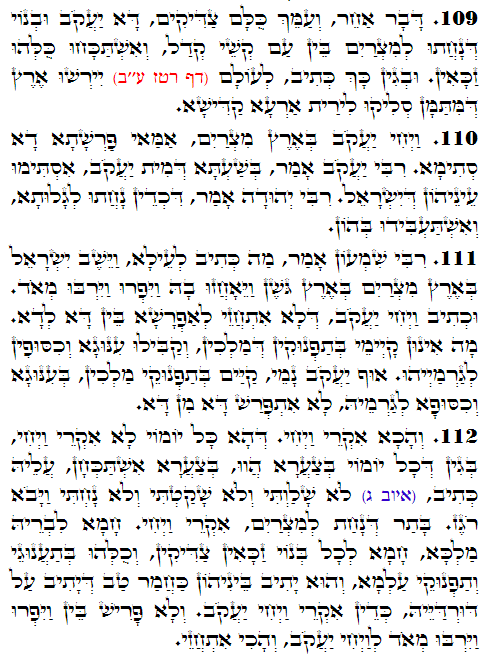Daily Zohar # 3532 – Vayechi – After years of sorrow comes good life
Hebrew translation:
110. וַיְחִי יַעֲקֹב בְּאֶרֶץ מִצְרַיִם. לָמָּה פָּרָשָׁה זוֹ סְתוּמָה? רַבִּי יַעֲקֹב אָמַר, בְּשָׁעָה שֶׁמֵּת יַעֲקֹב, נִסְתְּמוּ עֵינֵיהֶם שֶׁל יִשְׂרָאֵל. רַבִּי יְהוּדָה אָמַר, שֶׁאָז יָרְדוּ לַגָּלוּת וְהִשְׁתַּעְבְּדוּ בָהֶם.
111. רַבִּי שִׁמְעוֹן אָמַר, מַה כָּתוּב לְמַעְלָה? וַיֵּשֶׁב יִשְׂרָאֵל בְּאֶרֶץ מִצְרַיִם בְּאֶרֶץ גֹּשֶׁן וַיֵּאָחֲזוּ בָהּ וַיִּפְרוּ וַיִּרְבּוּ מְאֹד, וְכָתוּב וַיְחִי יַעֲקֹב, שֶׁלֹּא רָאוּי לְהַפְרִיד בֵּין זֶה לָזֶה. מַה הֵם עוֹמְדִים בְּתַפְנוּקִים שֶׁל מְלָכִים וּמְקַבְּלִים לְעַצְמָם עֹנֶג וְכִסּוּפִים, אַף יַעֲקֹב גַּם עוֹמֵד בְּתַפְנוּקֵי מְלָכִים בְּעֹנֶג וְכִסּוּף לְעַצְמוֹ, לֹא נִפְרָד זֶה מִזֶּה.
112. וְכָאן נִקְרָא וַיְחִי, שֶׁהֲרֵי כָּל יָמָיו לֹא נִקְרָא וַיְחִי, מִשּׁוּם שֶׁכָּל יָמָיו הָיוּ בְצַעַר, בְּצַעַר נִמְצְאוּ, כָּתוּב עָלָיו (איוב ג) לֹא שָׁלַוְתִּי וְלֹא שָׁקַטְתִּי וְלֹא נָחְתִּי וַיָּבֹא רֹגֶז. אַחַר שֶׁיָּרַד לְמִצְרַיִם נִקְרָא וַיְחִי. רָאָה אֶת בְּנוֹ מֶלֶךְ, רָאָה אֶת כָּל בָּנָיו צַדִּיקִים וְכֻלָּם בְּתַפְנוּקֵי וְתַעֲנוּגוֹת הָעוֹלָם, וְהוּא יוֹשֵׁב בֵּינֵיהֶם כְּיַיִן טוֹב שֶׁשּׁוֹקֵט עַל שְׁמָרָיו, וְאָז נִקְרָא וַיְחִי יַעֲקֹב, וְלֹא הִפְרִיד בֵּין וַיִּפְרוּ וַיִּרְבּוּ מְאֹד לְבֵין וַיְחִי יַעֲקֹב, וְכָךְ רָאוּי.
.
Zohar Vayechi
#109
Another explanation to ‘Also your people shall all be righteous’. The righteous are Jacob and his sons that went down to Egypt to dwell among people that are opposite the Light.
It said on them ‘They shall inherit the land forever’ because they got out of Egypt to inherit theHoly Land.
#110
There is no space between the end of Vayigash and the beginning of Vayechi. It is called a ‘closed Parsha’. The Zohar asks why it is so and answers that because of the death of Jacob in this parashah, the eyes of Israel closed. Rabbi Yehuda says that after the death of Jacob they went down to exile, and the Egyptians enslaved them.
#111
The last verse of Vayigash says;
Genesis 47:27
“וַיֵּשֶׁב יִשְׂרָאֵל בְּאֶרֶץ מִצְרַיִם בְּאֶרֶץ גֹּשֶׁן וַיֵּאָחֲזוּ בָהּ וַיִּפְרוּ וַיִּרְבּוּ מְאֹד.”
“So Israel dwelt in the land of Egypt, in the country of Goshen; and they had possessions there and grew and multiplied exceedingly.”
Rabbi Shimon explains that Israel enjoyed the delights of kings, then at the beginning of Vayechi, it says “And Jacob lived” without space between the verses. It indicates that it is not proper to separate the verses because the children of Israel enjoyed pleasures and fulfilments at the level of kings and so was Jacob that enjoyed pleasures and luxuries like kings.
#112
“And Jacob lived” to tell us that after many years of sorrow, Jacob enjoyed life in Egypt. On Jacob it is written;
Job 3:26
“לֹא שָׁלַוְתִּי וְלֹא שָׁקַטְתִּי וְלֹא נָחְתִּי וַיָּבֹא רֹגֶז.”
“I am not at ease, nor am I quiet; I have no rest, for trouble comes.”
‘not at ease’ – when Jacob lived and worked for Laban.
‘nor am I quiet’ – from Esau that hated him.
‘I have no rest’ – from what happened with Dina and Shechem.
‘for trouble comes’ – because Joseph was sold to slavery.
After Jacob came to Egypt he was pleased to see his son as a King, his children pure and righteous, and he could live among them, enjoying the pleasures of this world.
Because his sons ‘lived’ in Egypt ‘and multiplied exceedingly’, which is the end of Vayigash “And Jacob lived” at the beginning of Vayechi is a proper continuation to have without separation.
Lesson;
After Jacob and Josef passed away, the children of Israel lost the connection to Tiferet and Yessod that provided them with protection in Egypt. After that loss, they started the difficult process of exile that would lead to the Final Redemption.
The end of the book of Genesis teaches us an important lesson. At this stage of the story, we have Abraham, Isaac, Jacob, and Joseph that became chariots of Light for Chessed, Gevurah, Tiferet, and Yessod. The 12 tribes left with the work to complete the Sefirot of Zeir Anpin and connect to Malchut. Moses and Aaron will come in the next book, which is Exodus to support Netzach and Hod. They will lead the people out of Egypt to receive the Torah, Zeir Anpin, and enter the Promised Land that is Malchut.
The order of the seven Ushpizin that we invite to the Sukkah during the holiday of Sukkot is different between Ashkenazi and Sefaradi. Ashkenazi puts Joseph (Yessod) ahead of Moses (Netzach) and Aaron (Hod). Even though the order of the Sefirot is different, this is not wrong because Joseph came before Moses and Aaron, and he is still on the Center column.
{||}

 Previous: Vayechi
Previous: Vayechi


